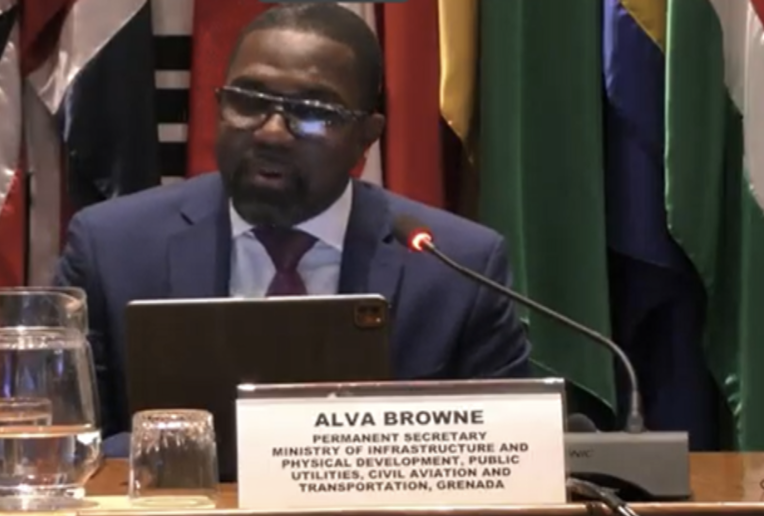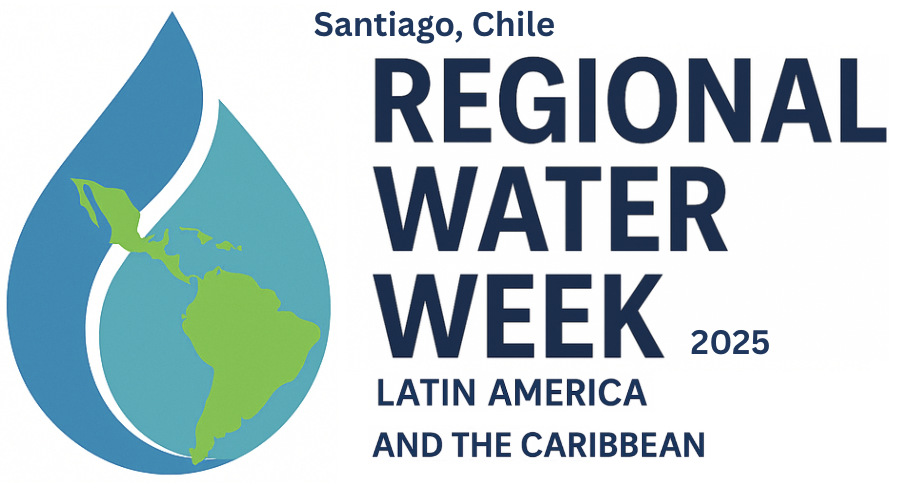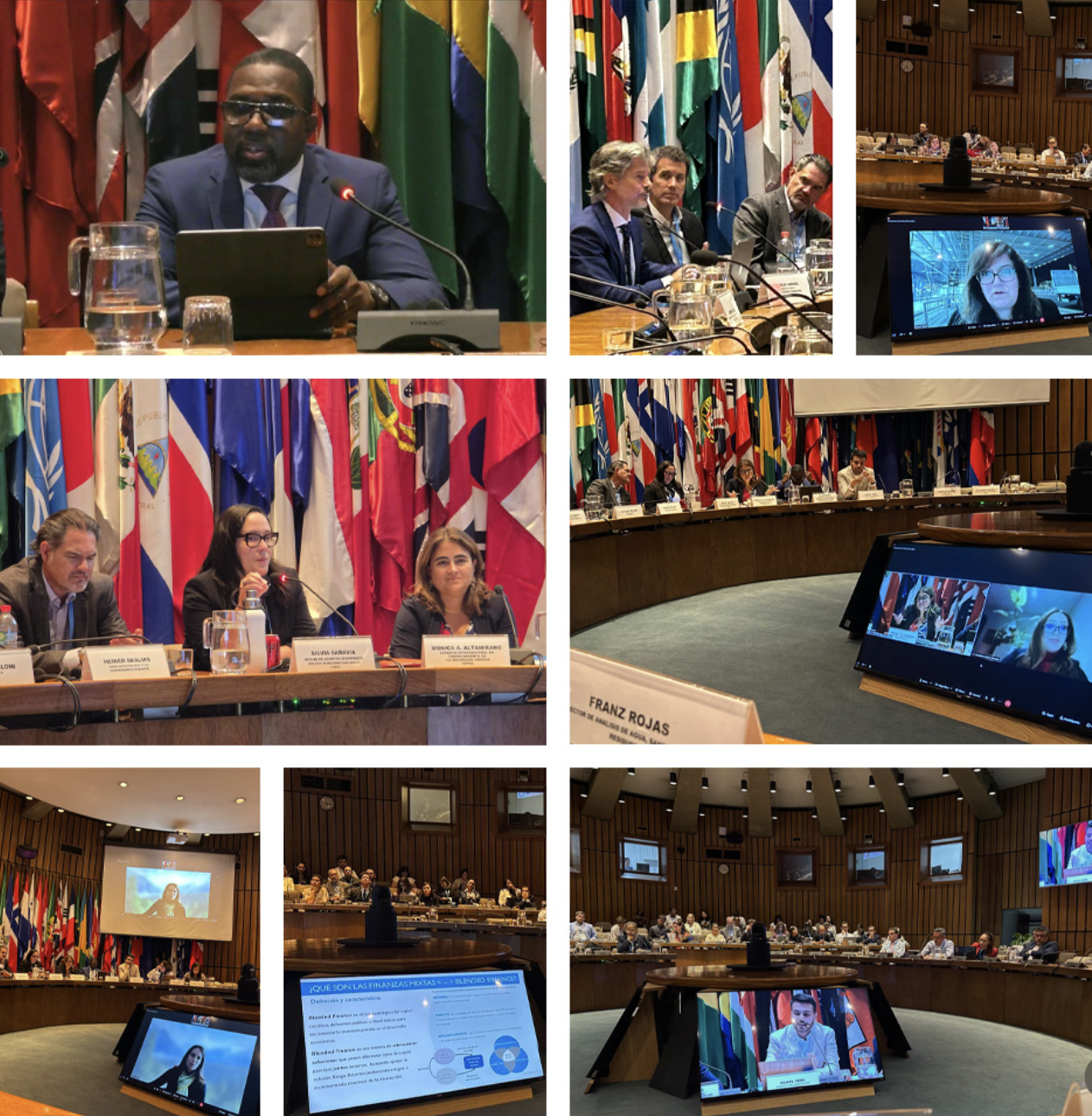The Caribbean’s playbook for closing the water implementation gap at Regional Water Week 2025
Work area(s)
Topic(s)
Santiago, 8 October 2025 — In Block 2, “Climate Finance for Water Security,” within the session “Closing the Implementation Gap for Water Security in LAC (Latin America and the Caribbean)” at the 2025 Regional Water Week, Mr. Alva Browne, Permanent Secretary of Grenada’s Ministry of Infrastructure, Public Utilities, Civil Aviation and Transportation, delivered a keynote that framed water security as the lifeblood of climate resilience for small islands and the broader LAC region. Speaking on behalf of the Government of Grenada and the Caribbean, he called for delivery over diagnosis and outlined three pillars to close the implementation gap: Integration, Investment, and Inclusion, 3 key ‘I’s.

Opening Salutations & Acknowledgements: Distinguished representatives from the United Nations Economic Commission for Latin America and the Caribbean, Global Water Partnership, colleagues from partner governments, civil society, academia, and the private sector — Good Afternoon
It is both an honour and a privilege to be invited to Share some thoughts with you on behalf of the Government of Grenada, and by extension, the governments and people of the Caribbean. I also bring warm greetings and best wishes from the Honourable Dickon Mitchell, Prime Minister of Grenada and Minister responsible for Public Utilities, under whose portfolio the critical matter of water governance falls.
Let me first thank ECLAC and its partners for convening this Regional Water Week under such a timely and fitting theme — Closing the Implementation Gap for Water Security.
For us in the Caribbean, this is not an abstract discussion. It is our daily reality — it defines the rhythm of our lives and the resilience of our islands. It underpins our very existence and that of the planet.
Grenada’s Water Security Reality: In Grenada, Carriacou, and Petite Martinique, (off course we are tri-island nation) water availability has become one of our most pressing climate challenges.
In May 2024, Grenada declared a national water crisis — our worst since 2010 — after months of drought left reservoirs at historic lows. Communities endured rationing and service interruptions; our National Water and Sewerage Authority worked alongside the Red Cross to truck water to rural parishes. It was a stark reminder that our systems were not built for the long dry seasons we now face.
Barely six months later, in November 2024, the pendulum swung the other way. Torrential rains triggered flash floods and landslides, damaging pipelines and cutting service to entire parishes. In some areas, those floods caused greater losses than Hurricane Beryl had, just months before.
Friends, Colleagues: We are living through what I call hydro-climatic extremes — shifting from drought to flooding, from too little water to too much, all within the same year. And according to our national utility, nearly 40 percent of treated water is still lost through leaks, showing just how much pressure our systems are under.
For our sister island Carriacou, where families depend on rainwater harvesting, the drought of 2024 and damage to desalination systems after Beryl showed how thin our safety margins truly are.
Progress & Institutional Reform: Yet in the midst of these challenges, there is progress. Through the Grenada Climate Resilient Water Sector Project — G-CREWS — we are modernizing infrastructure, reforming policy, and building a stronger institutional foundation for sustainable water management.
The creation of our Water Resource Management Unit and the new Water Resource Management and Regulation Act represent a turning point — bringing together watershed management, land use, and climate resilience under one coherent framework.
Our collaboration with the Global Water Partnership-Caribbean (GWP-C), headquartered in Grenada, ensures that these national advances feed into regional capacity-building. Through GWP-C’s leadership, integrated water resources management is becoming standard practice across Caribbean states, supported by knowledge-sharing and financing readiness efforts. So, as we attempt to close the GAP it is absolutely critical to build the institutional, legal and regulatory frameworks to enable effective implementation.
Science-Informed Planning & Regional Cooperation: Just this August, the Caribbean Science Symposium on Water, convened by GWP-C during World Water Week, reminded us that science is infrastructure. Data, models, and monitoring are as essential as pipes and pumps.
The Symposium’s message was clear — we must move from plans to progress. And this is why we are here in Santiago this week. National Adaptation Plans must treat water as central to climate resilience, not a side chapter. Grenada has taken this to heart. And so, only last week, our Cabinet approved the revised National Adaptation Plan 2025-2030, with water security as a central pillar. This plan sets out a programme of action to improve availability, upgrade infrastructure, and ensure equity — so that rural and elevated communities are not left behind.
Together with our National Sustainable Development Plan 2020-2035, this alignment between adaptation and development creates scaffolding to turn ambition into implementation.
Regional Perspective & Collective Voice: Colleagues, Grenada’s progress forms part of a broader regional momentum where countries are advancing water security through their National Adaptation Plans.
Trinidad and Tobago is already well into the implementation phase of its plan, demonstrating how institutional reform and wastewater reuse can translate policy into practical adaptation.
Guyana is in the readiness stage, strengthening hydrological data systems and aligning its Climate Change Policy to pave the way for a full NAP and access to climate finance.
Saint Lucia has established a dedicated Water NAP, cantered on inclusion, while Barbados continues to lead with its Roof-to-Reef Programme, linking ecosystems and water governance. Together with Grenada’s newly approved NAP 2025–2030, which places water at the heart of our national resilience strategy, these efforts show a region moving decisively from planning to action. Closing the GAP!!!
Friends, our collective test now is implementation — ensuring integration, investment, and inclusion to deliver real results on the ground.
To bridge that gap, we must focus on three pillars (and I like to think of it as 3 key ‘I’s:
1. Integration — Integration begins with how we manage water not as a single utility issue, but as part of a broader national system that connects land, energy, agriculture and people. In Grenada the establishment of our Water Resource Management Unit has hastened our progress towards integrated Water Resources Management, ensuring that decisions on watershed protection, land use, and infrastructure development are coordinated rather than fragmented. This integrated approach helps us balance competing needs from energy and agriculture to tourism and domestic use while safeguarding our rivers and aquifers for future generations.
Across the Caribbean, Utilities continue to grapple with non-revenue water - the difference between what is produced and what reaches customers. The Inter-American Development Bank’s 2021 Caribbean Water Utility Benchmarking Study found that losses range from 20 to 75%, averaging around 46% across the region. These inefficiencies are not just technical problems, they translate into wasted energy, reduced revenues, and lost opportunities for equity and climate resilience. Tackling them is central to integration - ensuring that water, energy and land systems work together efficiently and sustainably.
And that leads us to the second ‘I’ - Investment because integration requires the resources and partnerships necessary for success
2. Investment - it is not just about attracting funds: it is about investing wisely and investing first at home. Apart from seeking grants and loans, we must commit national budgets that show ownership and seriousness. In Grenada, we continue to prioritise water and sanitation through budgetary allocations, regulatory reforms and partnerships that strengthen institutional capacity. Public-private partnerships also have an essential role - helping reduce system losses, expand wastewater reuse and modernise infrastructure.
We are deeply appreciative of our regional and international partners, such as the Development Bank of Latin America and the Caribbean (CAF), whose ongoing support - including recent grants to strengthen regional water resilience, like in Barbados, reflects true solidarity in financing our shared future. But investment must always lead to impact. Every dollar spent on water security should deliver a return - in productivity and resilience for generations to come.
3. Inclusion — reminds us that resilience is built by people, not just projects. It is about recognizing that women and men, girls and boys, our elderly men and women and persons with disabilities all experience water differently - in how they access it, depend on it, and are affected when its scarce or unsafe. Inclusion also means understanding our geographic realities. In Grenada, our sister islands of Carriacou and petite Martinique rely heavily on rainwater harvesting and desalination - a situation mirrored in several other small Caribbean islands. When these systems are disrupted, entire communities face hardships. Across our region there are still many rural and hillside communities that remain cut off from reliable water networks, where local leaders and households rely on creativity and traditional knowledge to harvest and store water. True inclusion means reaching these communities too - ensuring that even the most remote families, wherever they live, share equally in the security and dignity that safe water provides.
Closing: Colleagues, water is the lifeblood of resilience. For small islands like Grenada, securing it means protecting our health, our food systems, our economies, and our dignity. And I am sure its the same for all of you!
The Caribbean stands ready to work with our Latin American partners, the European Union, and the global community to ensure that the coming decade is one of delivery — not diagnosis.
On behalf of the Government of Grenada and the people of the Caribbean, I thank ECLAC and our partners for this platform, and I reaffirm our commitment to a climate-resilient, inclusive, and water-secure Caribbean and Latin America for ALL.
Thank you.
Related content

Regional Water Week for Latin America and the Caribbean – Santiago, Chile 2025
The Economic Commission for Latin America and the Caribbean (ECLAC), together with the Conference of Ibero-American Water Directors and Authorities (CODIA) and the Government of Chile, through the…

Session: Closing the Implementation and Financing Gap for Water Security in Latin America and the Caribbean – Regional Water Week 2025
During the 2025 Regional Water Week, ECLAC and its strategic partners convened the special session “Closing the Implementation and Financing Gap for Water Security in Latin America and the…
Country(ies)
-
Grenada